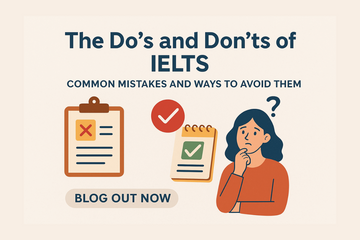The IELTS exam (International English Language Testing System) is one of the most popular English language proficiency tests in the world. Whether you want to study abroad, migrate, or work in an English-speaking country, a good IELTS score is often the first step.
However, even students who have good English skills sometimes make mistakes in the exam-not because they don’t know the language, but because of stress, lack of strategy, or simple carelessness. The good news is: these mistakes can be avoided with the right preparation.
In this blog, we’ll go through the most common mistakes students make in IELTS and give you clear, practical tips on how to avoid them.
1. Not Understanding the Test Format
The Mistake: Many students jump straight into preparation without properly understanding the structure of the IELTS exam. They don’t know how many sections there are, how much time they get or what types of questions will be asked.
Why It Matters?
If you are not familiar with the format, you will waste time in exam fighting things out instead of focusing on answering correctly.
How to Avoid It?
- Read the official IELTS guidelines.
- Understand the four sections: Listening, Reading, Writing, and Speaking.
- Practice with mock tests to become comfortable with the exam style.
Tip: Think of the IELTS like a game—you must know the rules before you can win!
2. Poor Time Management
The Mistake: Students often spend too much time on one question and then rush through the rest. In the Writing section, some write a lot for Task 1 and run out of time for Task 2 (which carries more marks).
Why It Matters?
IELTS is a timed test. No matter how good your answers are, if you don’t complete them, you lose marks.
How to Avoid It?
- Practice under timed conditions regularly.
- Divide your time smartly: for example, in Writing, spend 20 minutes on Task 1 and 40 minutes on Task 2.
- Don’t get stuck—if a question is difficult, move on and return later if time allows.
3. Writing Off-Topic Essays
The Mistake: In the Writing section, some students write essays that are not directly answering the question. They may write generally about the topic but fail to address the specific task.
Why It Matters?
Even if your grammar is perfect, writing off-topic will reduce your Task Achievement score.
How to Avoid It?
- Read the question carefully.
- Underline keywords and make sure you understand what is being asked (e.g., discuss both views, agree or disagree, advantages and disadvantages).
- Plan your essay briefly before writing.
4. Weak Vocabulary and Repetition
The Mistake: Students often repeat the same simple words (like good, bad, big, small) in essays and speaking.
Why It Matters?
Repetition lowers your Lexical Resource score. IELTS examiners expect you to show a range of vocabulary.
How to Avoid It?
- Build your vocabulary daily. Learn synonyms and phrases for common words.
- Instead of good, try beneficial, valuable, and effective.
- Practice using new words in sentences, not just memorizing them.
Tip: Quality is better than quantity. Use advanced words only if you are confident about them.
5. Incorrect Grammar and Sentence Structure
The Mistake: Common errors include mixing up tenses, subject-verb disagreement, or writing very long, unclear sentences.
Why It Matters?
Grammar contributes significantly to your score. Even a strong idea loses impact if written incorrectly.
How to Avoid It?
- Revise basic grammar rules—tenses, articles, subject-verb agreement.
- Keep sentences clear and simple. Don’t try to impress with overly complex structures.
- After writing, quickly check for grammar mistakes.
6. Poor Listening Skills
The Mistake: Many students try to “memorize” answers or lose focus when listening. Some panic if they miss one answer, and then miss several more.
Why It Matters?
The Listening test moves quickly, and you only hear the audio once. Missing focus can cost many marks.
How to Avoid It?
- Practice listening to English daily—podcasts, news, movies.
- Improve your ability to understand different accents (British, Australian, and American).
- Don’t panic if you miss one answer—move on quickly to the next.
Tip: Use the 30 seconds given at the end to check your spelling and grammar carefully.
7. Reading Without a Strategy
The Mistake: Some students read every word in the passage, while others skim too quickly and miss details. Both approaches lead to losing marks.
Why It Matters?
The IELTS Reading test is about speed and accuracy—you must find answers quickly within the given time.
How to Avoid It?
- Use scanning (looking for specific words) and skimming (getting the general idea) techniques.
- Practice identifying keywords in questions and matching them with the text.
- Don’t spend too long on one question.
8. Speaking Like a Robot
The Mistake: Many students memorize answers for the Speaking test or give very short, one-word replies. Others speak unnaturally, trying to sound “perfect.”
Why It Matters?
The Speaking test checks communication skills, not memorization. Sounding robotic will reduce your Fluency and Coherence score.
How to Avoid It?
- Practice speaking naturally with friends or even by recording yourself.
- Expand your answers—don’t just say “Yes” or “No.” Give explanations and examples.
- It’s okay to pause briefly to think. Just don’t stay silent too long.
Tip: Treat the Speaking test as a conversation, not an interrogation.
9. Ignoring Spelling and Handwriting
The Mistake: In Listening and Reading, students lose marks for misspelled words. In Writing, messy handwriting makes it hard for examiners to read.
Why It Matters?
IELTS doesn’t give partial marks for “almost correct.” Spelling mistakes = wrong answer.
How to Avoid It?
- Practice spelling common academic words.
- Write clearly in the exam. Don’t rush so much that your handwriting becomes unreadable.
10. Not Practicing with Real Test Materials
The Mistake: Some students practice only with random online exercises, not actual IELTS-style questions.
Why It Matters?
The IELTS has a very specific format. Without practicing it, you won’t be fully prepared.
How to Avoid It?
- Use authentic IELTS practice tests.
- Take full-length mock exams under exam conditions.
- Review your mistakes and learn from them.
11. Stress and Nervousness
The Mistake: Even well-prepared students sometimes get too nervous during the test, leading to silly mistakes.
Why It Matters?
Nervousness affects concentration, especially in Speaking and Listening.
How to Avoid It?
- Practice relaxation techniques like deep breathing.
- Take mock exams to get comfortable with the test environment.
- Remind yourself: IELTS is not about perfection, but about communication.
End Note
Getting a high IELTS score is not just about knowing English—it’s about avoiding common mistakes and using smart strategies.
Here’s a quick recap of what we covered:
- Know the test format well.
- Manage your time wisely.
- Always answer the exact question.
- Improve your vocabulary and grammar.
- Practice Listening and Reading strategies.
- Speak naturally and confidently.
- Watch your spelling and handwriting.
- Practice with real IELTS materials.
- Stay calm and confident.
Remember, success in IELTS comes with consistent practice and the right mindset. If you learn from these common mistakes and avoid them, you’ll be one step closer to achieving your target band score.
So start preparing smartly, and go into your IELTS exam with confidence!








gpzhzn
gpzhzn
fyb1ib
lr9cht
l3m2wm